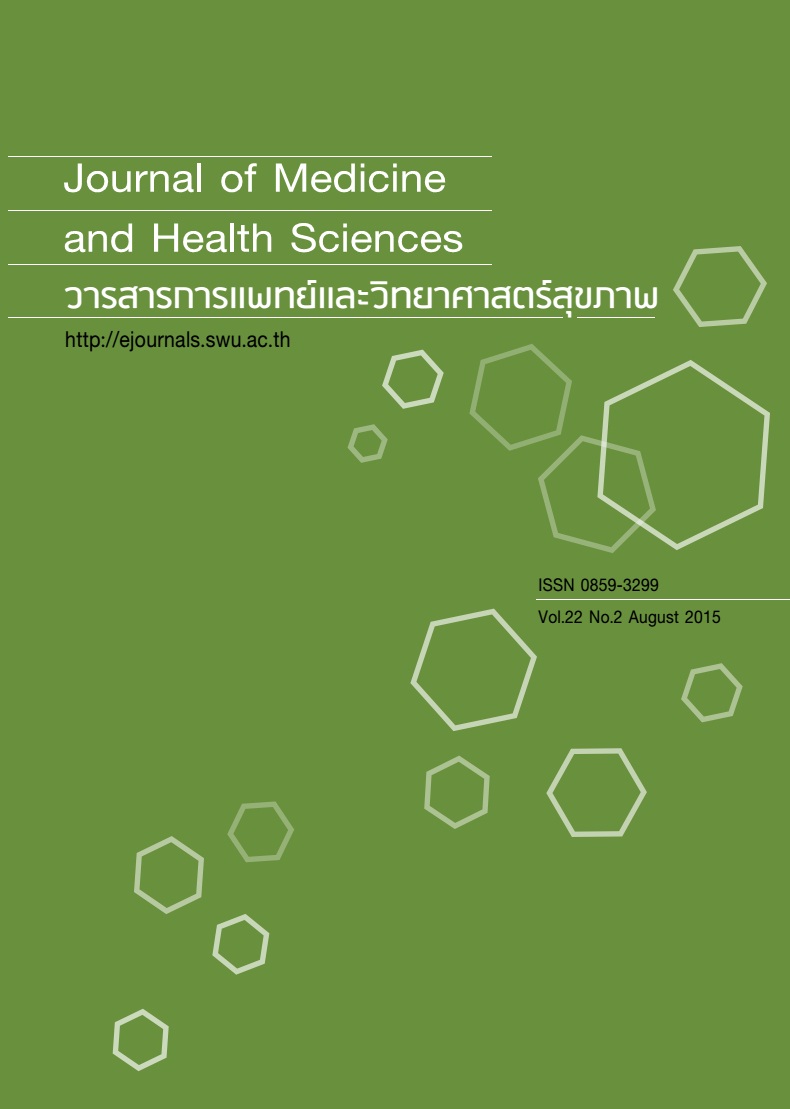Malaria Diagnosis Quality Management System in Malaria Clinics, Thailand
Keywords:
ระบบจัดการคุณภาพ, การประเมิน, การตรวจวินิจฉัยไข้มาลาเรีย, มาลาเรียคลินิก, Quality Management System, Evaluation, Malaria Diagnosis, Malaria ClinicsAbstract
The purpose of this study was to evaluate malaria diagnosis quality management system in malaria clinics of Thailand, and to use the results to maintain or improve malaria diagnosis quality management system for the effectiveness and reliability of the malaria diagnosis by using the CIPP Model (context, input, process and product) as the tool in evaluation. The research data drawn and assessed for this study were received from existing documents of malaria diagnosis quality management system in malaria clinics projects, namely [1) the project of quality control on malaria rapid test kit (QC-malaria RDT project), 2) The project of international standard accreditation of diagnostic control and identification on malaria (rechecking project) and 3) the project of the proficiency testing on malaria diagnostic staff in malaria clinics (proficiency testing project)], the implementations reports in fiscal year 2013-14 and some questionnaires from related staff for suspect issues. Data were be analyzed through statistical analysis term (frequency, percentages and means) by Excel program for windows. The study results were evaluated through 4 issues such as context, input, process, and products. Context evaluation found that for Project 1: the objectives were not consistently with the principle and rationale. For input evaluation found Project 1 on the issues of budget, materials and personnel were not sufficiently, while project 2 lacked of personnel and project 3 showed budget, materials and personnel were sufficiently. For the process evaluation, all three projects were implemented as planned. For product evaluation, Project 1 showed a test results at 100%, Project 2 in fiscal year 2013 displayed mistaken diagnosis in the malaria clinics with a high numbers of slides, Project 3 revealed the twice times of evaluation of proficiency testing at 70.83% and 93.30%, respectively. This study recommended that the skill performance evaluation should be added in using malaria rapid test kits in QC-malaria RDT project. While the rechecking project could increase the percentage of rechecked slides in low endemic malaria areas and the proficiency testing project should expand into other sections.
การประเมินระบบจัดการคุณภาพการตรวจวินิจฉัย ไข้มาลาเรียในมาลาเรียคลินิกของประเทศไทย
การศึกษานี้มีวัตถุประสงค์เพื่อประเมินระบบจัดการคุณภาพการตรวจวินิจฉัยไข้มาลาเรียในมาลาเรียคลินิก ของประเทศไทย เพื่อคงไว้หรือพัฒนาปรับปรุงระบบจัดการคุณภาพการตรวจวินิจฉัยไข้มาลาเรียในมาลาเรียคลินิกให้มี ประสิทธิภาพและความน่าเชื่อถือในการวินิจฉัยไข้มาลาเรีย โดยใช้รูปแบบซิป โมเดล (CIPP Model) เป็นกรอบในการ ประเมินซึ่งได้แก่ ด้านสภาวะแวดล้อม ด้านปัจจัยนำเข้า ด้านกระบวนการ และด้านผลผลิต วิธีการประเมินใช้วิธีวิเคราะห์ จากเอกสารโครงการระบบจัดการคุณภาพการตรวจวินิจฉัยไข้มาลาเรียในมาลาเรียคลินิกของประเทศไทย ได้แก่ 1) โครงการงานควบคุมคุณภาพชุดตรวจเชื้อมาลาเรียอย่างรวดเร็ว (QC-malaria RDT) 2) โครงการพัฒนางานบริการชันสูตร และควบคุมคุณภาพการตรวจวินิจฉัยโรคติดต่อนำโดยแมลงซึ่งเป็นที่ยอมรับตามมาตรฐานสากล 3) โครงการการทดสอบ ความชำนาญ (proficiency testing) การตรวจวินิจฉัยเชื้อมาลาเรียในมาลาเรียคลินิก รายงานผลการดำเนินงานของ โครงการฯ ปีงบประมาณ 2556-2557 และจากการสัมภาษณ์ผู้ดำเนินโครงการเฉพาะในประเด็นที่สงสัย วิเคราะห์ค่าสถิติ (ความถี่ ร้อยละ ค่าเฉลี่ย) ด้วยโปรแกรมสำเร็จรูป Excel สำหรับวินโดว์ผลการศึกษาประเมินผ่านตัวแปร 4 ด้าน ได้แก่ สภาพแวดล้อม ปัจจัยนำเข้า กระบวนการ และผลผลิต พบว่าผลการประเมินด้านสภาพแวดล้อมพบเฉพาะโครงการที่ 1 ที่ วัตถุประสงค์ไม่สอดคล้องกับหลักการและเหตุผล ผลด้านปัจจัยนำเข้าโครงการที่ 1 พบว่างบประมาณ วัสดุ และบุคลากร ครอบคลุมได้เพียงบางส่วน โครงการที่ 2 ขาดในเรื่องบุคลากร และโครงการที่ 3 ทั้งงบประมาณ วัสดุและบุคลากรมีความ เพียงพอ ด้านกระบวนการพบว่าทั้ง 3 โครงการมีการดำเนินการตามแผนที่วางไว้ผลผลิตโครงการที่ 1 ได้ผลการทดสอบผล คิดเป็นร้อยละ 100 โครงการที่ 2 ผลการดำเนินงานในปี2556 พบว่ามีการตรวจวินิจฉัยผิดพลาดในหน่วยงานที่มีตัวอย่าง ตรวจจำนวนมาก โครงการที่ 3 ทำ 2 ครั้งผ่านเกณฑ์คิดเป็นร้อยละ 70.83 และ 93.30 ตามลำดับ มีข้อเสนอแนะสำหรับ โครงการงานควบคุมคุณภาพชุดตรวจเชื้อมาลาเรียอย่างรวดเร็วดังนี้ควรเพิ่มการประเมินประสิทธิภาพความชำนาญในการ ตรวจวินิจฉัยการตรวจหาการติดเชื้อมาลาเรียด้วยชุดทดสอบน้ำยาตรวจเชื้อมาลาเรียอย่างรวดเร็ว ควรเพิ่มร้อยละของการ ตรวจสอบซ้ำในพื้นที่ที่มีไข้มาลาเรียต่ำ และการทดสอบความชำนาญของผู้ตรวจวินิจฉัยควรขยายให้ครอบคลุมทุกหน่วยงาน



